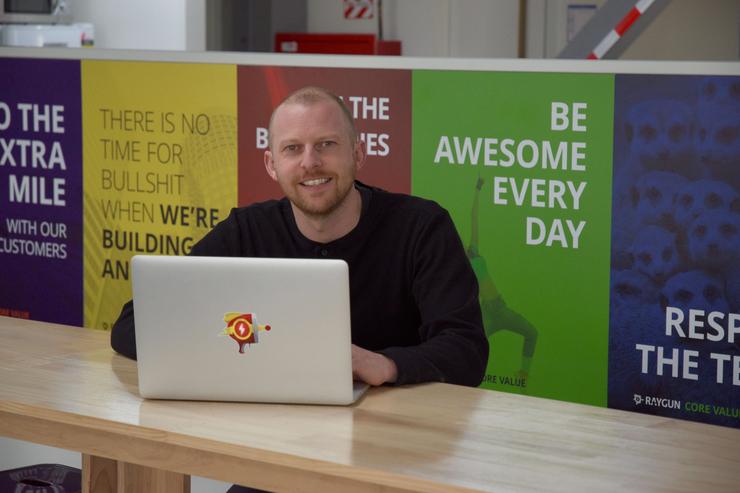
Nick Harley of Raygun: ‘Every mistake you can think of, I made it.’
"I was more than ready to give education the boot at the earliest opportunity.
That seemed to be an unconventional option to my school’s careers advisor. Trying to steer me away from the idea with vigour, but ultimately without success.
Growing up in the UK, I didn't find school particularly engaging. Add in a few bouts of bullying to deal with along the way and that ensured I just wanted to get out of there as soon as I possibly could.
I ignored any advice given and scored myself a job in the construction industry. Embarking on a plumbing apprenticeship well before I sat my final exams.
To me this was my way out, and the construction industry is where I stayed happily for quite a while. Working as a plumbing and heating engineer for almost a decade.
Flash forward several years, I now lead the marketing team for a hi-tech product on the other side of the planet.
As one of New Zealand’s fastest growing companies, Raygun competes head to head with Silicon Valley giants from our HQ in Wellington, plus our Seattle offices. We have a highly technical product, selling to software teams. Quite the departure from the world of plumbing. So naturally, when someone asks me what my own story is, I usually warn them we could be here a while.
Though it might sound cliché, my own story is proof that anything is possible if you put your mind to it. And that’s also true when building a successful business.
Walking my own path
A shy and unconfident kid at school, entering the construction industry at 16 hardened me up to the realities of full-time work. But it wasn’t until I went backpacking in my mid-20s that I realised there was a whole world to explore too. It also dawned on me that my original career path wasn’t one I wanted to return to.
I found myself reading as many books by successful entrepreneurs as I could. Richard Branson, Steve Jobs and the cast of Dragons Den became my company as I frequented train stations, airports, boats and beaches on my travels.
During this time I also obtained first hand experience how awful the front desk software seemed to be at the hostels and hotels I laid my head at each night. So towards the end of my adventures I began building a property management system, aiming to bring those reception desks into the modern online world. This was at the time cloud based systems were in their infancy and to be perfectly honest, I had no idea what I was doing.
I knew nothing about software, but produced something that was sellable with the help of several freelancers.
Without gaining enough customers, the business slowly ran out of money and was sold to a hostel franchise group a few years later. This was the first of many attempts to start something that sadly failed to get off the ground.
 Credit: Picture: Dennis Skley (Flickr)
Credit: Picture: Dennis Skley (Flickr) Raising too much money early on and chasing vanity metrics is a mistake that I unfortunately see time and time again in startup land.
With each business I spun up in the years that followed I seemed to learn a new lesson. The market size was too small. The product didn’t resonate. There was a lack of alignment with co-founders. I was selling to the wrong people. I did it all. Every mistake you can think of, I made it.
The biggest problem I faced was assuming that people wanted to buy what I was building. Only now do I know the value of rigorous customer research and testing. Building a product before you talk to potential customers only leads you to a very difficult position to recover from.
Solving a problem for someone is the best way to start a business. But knowing how the customer wants that problem to be solved is the only way to build what the market wants to buy.
Boarding the rocketship
Failing at something really sucks, but for me failures were a chance to learn. At least that’s how I came to see things when it kept becoming a regular occurrence. Building up savings and then going back to zero on your bank balance with only the experience to show for it is extremely draining emotionally.
So when an opportunity came up at a promising, early stage company with global ambitions, I knew I wanted to get on board. By this stage I’d become skilled in all sorts of disciplines. I understood app development and had learnt to code. I knew various digital marketing tools inside out. I’d done my fair share at managing teams. All self taught by just trial and error. But more importantly, I had the right attitude to start getting things done. In the early stages especially, startups need generalists. And I was certainly one of them.
Several years have passed and Raygun is now sold in over 100 countries and used by some of the world’s leading brands. Companies use Raygun to diagnose software bugs and performance issues affecting their customers. Developers enjoy detailed diagnostics on issues in their codebase and spend more time building software rather than fixing it and I’ve learned so much being an integral part of that high velocity growth period.
Aligning with your peers
Building a business that grows month after month without faltering is incredibly difficult. I cannot even begin to explain to people how hard it is. For founders, that journey is even harder. It’s certainly a lot harder than I thought it would be.
My own views on what success looks like aligned well to that of Raygun’s founders John-Daniel Trask and Jeremy Boyd from the start.
For a business to be successful, it needs to make money. Otherwise it's not actually a business.
To date, growth has been created through generating increased revenues, rather than raising venture capital. Something that’s not easy to accomplish.

Building a product before you talk to potential customers only leads you to a very difficult position to recover from.
Raising too much money early on and chasing vanity metrics is a mistake that I unfortunately see time and time again in startup land. Building a sustainable business should be a bigger focus than raising money. Mainly because you’re likely going to need that money to scale further once you’ve worked out a formula that works. It’s a recipe for disaster if you give your product away for free just to try and demonstrate some traction and user growth.
If you build something of value and people are willing to pay you for it, that’s when you know you actually have a business under your feet.
This Silicon Valley mentality is less prevalent in New Zealand. But people offering their ‘congratulations’ when companies announce a funding round doesn't sit well with me. I don’t see many stories about businesses becoming profitable, which is a real shame. It should be celebrated more.
Building a world class team
I feel very fortunate to work with a diverse and talented marketing team who care deeply about their work. We’ve worked hard on developing a culture of freedom, ownership and accountability. An environment where people have the freedom to operate and work things out for themselves, knowing that it’s ok to fail and try new things. That likely stems from my own experiences of just getting stuck in. As a predominantly self taught individual myself, I don't see why anyone shouldn't be able to control their own destiny.
I also describe our team as ‘data conscious’ rather than ‘data driven’.. Everyone on the team has analytical skills, but being entirely driven by the data when making decisions has been a mistake in the past.
Most online marketing activities have become trackable to some extent. You can see how many impressions your ads obtained. How many clicks. How many conversions. Alongside how much associated revenue you’ve made off each activity. But this rarely tells you the full story. Or how campaigns interact with each other before someone finally decides to take an action.
It’s a recipe for disaster if you give your product away for free just to try and demonstrate some traction and user growth
Marketers I speak with always sight their inability to do proper attribution modelling or campaign tracking. Even if they are spending thousands of dollars on tools that promise to do so. So we make educated decisions rather than rely on only what the data shows. The internet is only set to become more privacy aware and tracking people will become harder to do in years to come, as we’ve seen with the recent General Data Protection Regulation (GDPR) changes.
Shaping the future
For me working at a high growth tech company is as rewarding as it is challenging. There are new issues and growing pains you have to solve constantly. It's part of the territory. I take great solace knowing that at any given moment, one part of the business will be on fire.
Though I can’t say we get it right every time, we’re on the right path and are excited about our next stage of growth.
My story may be unconventional, but it’s testament to the fact that every failure and challenge becomes a blip in history. Know your final destination, but live with the fact that you’ll take a few wrong turns on the way. Don’t sweat the small stuff and always be prepared that you’ll constantly be solving problems, no matter what you are striving to achieve.
People will remember you for those achievements rather than any failures.
As humans we fail at something every day.
Yes, it’s okay to fail.
Just don’t give up trying."

Nick Harley is director of marketing at software company Raygun.
Related reading:
- From Kiwi startup to global business: Tips from an entrepreneurial techie
- What it’s like to be a ‘continuous startup’
- Vince Warnock of Cigna: Thought from a fearless marketer
- From network engineer to head of customer voice
- How to provide the spark for continuous learning amidst ongoing disruption
- The harbour pilot who got involved in 'the business of first impressions'
- Machine learning is the ‘new normal’
- So you want to be the next unicorn?
Get the latest on digital transformation: Sign up for CIO newsletters for regular updates on CIO news, career tips, views and events. Follow CIO New Zealand on Twitter:@cio_nz
Join the CIO New Zealand group on LinkedIn. The group is open to CIOs, IT Directors, COOs, CTOs and senior IT managers.
